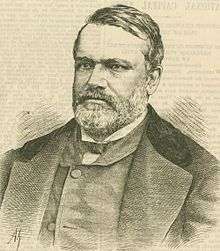Philip H. Morgan
| Philip Hicky Morgan | |
|---|---|
 | |
| 41st United States Minister to Mexico | |
|
In office January 26, 1880 – June 6, 1885 | |
| President | Rutherford B. Hayes |
| Preceded by | John W. Foster |
| Succeeded by | Henry R. Jackson |
| Personal details | |
| Born |
November 9, 1825 Baton Rouge, Louisiana |
| Died |
August 12, 1900 (aged 74) New York City, New York |
| Political party | Republican |
| Spouse(s) | Beatrice Leslie Ford Morgan |
| Profession | Lawyer |
Philip Hicky Morgan (November 9, 1825 – August 12, 1900) was an attorney, jurist, and diplomat from Louisiana who remained loyal to the Union during the American Civil War. He was called a 'traitor' in his home state.
Morgan was born in Baton Rouge to Thomas Gibbes Morgan and the former Eliza Ann McKennan; he was named for Colonel Philip Hicky. He was educated locally and then at the University of Paris in France from 1841 to 1846. He was fluent in modern languages, including French and Spanish. He was a first lieutenant in the Mexican-American War.
He joined his father's law practice in Baton Rouge in 1848. In 1853, he relocated his practice to New Orleans and continued there until the 1870s. On May 22, 1852, he married the former Beatrice Leslie Ford, daughter of Judge James Ford of Baton Rouge. The couple had nine children, but only five survived past childhood.
Morgan was a judge of the 2nd District Court of Louisiana from 1853 to 1857. U.S. President Andrew Johnson nominated him as the U.S. attorney in New Orleans in 1866, in part because of Morgan's refusal to side with the Confederacy, but the United States Senate did not approve the nomination. The appointment was made again by Johnson's successor, President Ulysses S. Grant in 1869; the Senate concurred, and Morgan served as U.S. attorney during Grant's first term.
Under temporary Republican Party rule in Louisiana from 1873 to 1876, Morgan was a justice of the Louisiana Supreme Court. In 1876, he became judge of the International Tribunal in Alexandria, Egypt, an appointment that bridged the Grant and Rutherford B. Hayes administrations. President Hayes named him envoy extraordinary and minister plenipotentiary to Mexico, a position that he held from January 26, 1880, to June 6, 1885. That position survived the administrations of Hayes, James A. Garfield, and Chester A. Arthur, but quickly ended when the Democrat Grover Cleveland became President.
After the assignment to Mexico, Morgan practiced law in New York City from 1885 to 1900. He died in New York City and is interred in Allegheny Cemetery in Pittsburgh.
References
- "Philip Hickey Morgan" (middle name misspelled), A Dictionary of Louisiana Biography, Vol. 1 (1988), p. 582
- "Philip Morgan," Dictionary of American Biography, XIII
- J.M. Callahan, American Foreign Policy in Mexican Relations (1932)
External links
- Philip H. Morgan in online version of Dictionary of Louisiana Biography [scroll through M surnames]
- Philip H. Morgan at Find a Grave
| Diplomatic posts | ||
|---|---|---|
| Preceded by John W. Foster |
U.S. Minister to Mexico 1880–1885 |
Succeeded by Henry R. Jackson |